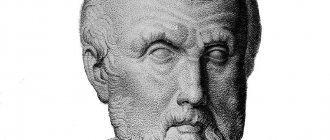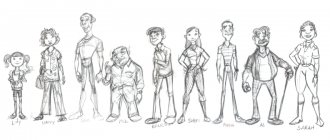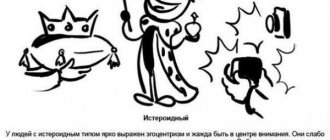Continuing the topic of personality typology, let me remind you that accentuation is a pronounced character trait that does not go beyond the norm of deviations in human psychology and behavior. Accentuation manifests itself to the greatest extent in certain unfavorable life circumstances for a person. This influences a person’s behavior and attitude towards others.
In the previous article, I described the classification of A. E. Lichko and mentioned that it is consonant with the classification of K. Leonhard, a German scientist and psychiatrist, they seem to complement each other. I will dwell on it in more detail.
What are character accentuations?
accentuation is , you first need to analyze the meaning of the word “ character ”. Typically, the term “character” is understood by psychologists as a set of stable personality traits that leave an imprint on behavior, relationships with people and oneself. Character is reflected in the entire life activity of an individual, the choice of contacts, giving behavior an individual shade . Character accentuation is the personality traits that are most expressed in a person. Scientists all over the world are studying accentuation due to the fact that when a character trait is excessively manifested, it is possible to create conditions favorable for the formation of mental disorders. To find accentuations, Leongard created a questionnaire that determines an individual’s accentuations.
The presence of certain accentuations does not mean going beyond the limits of normality , but sometimes it can become a factor that interferes with the normal construction of interpersonal relationships.
Each type of accentuation has “ weak points” that are most susceptible to injury under the influence of negative factors. Repeated trauma of this kind leads to deviant behavior.
Personality diagnostic methods
Leonhard considered observation and conversation to be the most reliable diagnostic methods. During a personal conversation, the scientist should not study verbal information coming from the patient, but focus on his facial expressions and changes in voice intonation. Studying the patient’s behavior at work, in a relaxed home environment, and in communication with other people, according to Leonhard, provides comprehensive information about the characteristics of his personality.
However, it is not always possible to carefully monitor patients even in a hospital setting. In this case, working with G. Šmishek’s questionnaire will come to the rescue.
The text of the questionnaire, the key for processing answers, a detailed description of individual scales and combinations can be found in the book by Yu.V. Kortneva “Diagnostics of a current problem. Leonhard-Smishek technique."
As a person grows up and his personality develops, bright accentuated features smooth out. By adapting to the demands of the social environment, the individual learns to control his natural temperament. As a rule, Leonhard’s character typology is used when working with teenagers whose character has not yet been completely established.
Types of character accentuation according to K. Leonhard
The author identifies three groups of character accentuation, differing in origin.
- as character (socially determined education);
- temperament (natural formation) included hyperthymic, dysthymic, cycloid, exalted, anxious and emotive types;
- At the personal level there were two types – extra- and introverted.
Personal level accentuations
In addition, with the properties of temperament and character, Leongard identified a separate typology of the personal level. In total, he examined two types - an extroverted personality and an introverted one.
- An extrovert, according to Leonhard, is a person who has a high degree of adaptation to the world around him. These are open people who easily change their minds and often fall under the influence of others. They are able to quickly and effectively absorb new information and also easily meet new people.
- An introvert, according to Leonhard, is the opposite personality type to an extrovert. Their gaze is directed into their personal inner world. Such people prefer to rely on personal experience, reason, philosophize and, with only rare exceptions, act. Such people often show conservatism in all areas of life, lead a closed and unsociable lifestyle and do not allow anyone to interfere in their lives.
Demonstrative type
A characteristic feature of this accentuation is demonstrative behavior , emotional liveliness, and artistry . Such people have a craving for fantasizing , lying and pretense, usually this is not due to the presence of malicious intent, they like to embellish their own personality in the eyes of others. They strive to be the center of attention and love praise and attention . This type of accentuation is characterized by rapid adaptation to new conditions and emotional mobility. They are inconsistent in their actions, one day they will confirm and agree with your point of view, and on the next they will completely sincerely say the opposite opinion.
Pedantic type
These people try to think through all possible options for action and behavior, so they cannot make an exact decision for a long time. Before doing something, they want to be completely sure that this is the best way out of a problem situation. Pedants take everything in life seriously , this can be both work issues and everyday issues. People around them may perceive this character trait with dissatisfaction and consider them boring and boring. They are distinguished by excellent perseverance ; they always bring what they plan to completion . People of the pedantic type are not ready for radical changes in their lives; they have difficulty surviving traumatic events, which can make them indecisive. They do not like to participate in conflicts and try by all means to avoid them.
Which personality types suit each other?
When becoming familiar with accentuations, most people are interested in the question of the ability to effectively interact with other psychotypes. We can talk about psychological compatibility when partners have similar positive qualities, which in most cases are the result of upbringing:
- responsibility;
- seriousness;
- goodwill;
- the ability to empathize.
If you need to figure out which personality types fit together, or whether a particular person is right for you, find out their positive characteristics first.
Incompatible partners, as a rule, have similar negative character traits: laziness, selfishness, irresponsibility, etc.
Stuck type
Personalities of this type of accentuation are characterized by a long-term influence of affects , short-term strong experiences. They tend to get stuck on certain thoughts and feelings. Most often this is self-esteem, hurt pride, injured pride. the boundaries of social justice for themselves , deciding what is “good” and “bad”; if the real situation does not correspond to the ideal one, they suffer. cannot forget grievances over a long period of time and are prone to conflict situations with people who once offended them. They have a clear division of people into friends and enemies; even with a slight offense, they can classify the offender into the second category. Often vindictive and suspicious. They don’t let go of the grudge, and I constantly think that they were treated unfairly . They often show jealousy. When achieving a goal, they show persistence , thanks to this they make strict demands on themselves and others. They are not used to listening to advice; they have their own opinion on any issue.
Conclusion
In this note, we looked at the typology that Karl Leonhard developed to describe the characters and temperaments of people (most often mentally ill). Although this classification is used in psychiatry (or rather, it was used), knowledge of these types can be useful to anyone who wants to better understand others and themselves. For a more detailed introduction to the concept of “accented personality,” you can read the work of the same name by Karl Leonhard, in which he not only described the types, but also presented their probable combinations. By the way, this book presents an analysis of 150 works, or rather the characters of these works, using this typology.
Excitable type
They are characterized by increased impulsiveness , low control of their own desires and inclinations, which are often led. Uncontrollable during violent emotional reactions .
Instinctiveness is characteristic : they do not take into account the voice of reason and sanity, they are subject to momentary desires and desires, without thinking about the consequences.
They often show irritability and intolerance towards their surroundings and cannot tolerate criticism . To people with this accentuation, study and work seem neither fun nor attractive. They usually do not set long-term and difficult-to-achieve goals and live in the present . It is difficult for them to get along in a team due to frequent conflicts. During them, they may show inappropriate emotional reactions, react violently and spend a long time sorting things out.
How to determine your personality type
Today you can find psychological tests online that will help you understand what type of personality you are according to one of the typologies.
Another way to find out your psychotype is to visit a psychologist and answer the questions asked.
When independently trying to determine one’s personality type, a person, as a rule, finds manifestations of different accentuations in himself and finds it difficult to choose.
Hyperthymic type
They are cheerful , cheerful and energetic. They attract others with their inexhaustible optimism , generosity and responsiveness . They take on leading positions and love big companies. It is easy to find a common language with them; they are distinguished by pronounced gestures and pronounced facial expressions . Hyperthyms always want to do something ; they do not tend to spend time passively. They find it difficult to endure monotonous activities and strict discipline. They can’t complete a task, if it becomes uninteresting , they quit halfway.
Dysthymic type
Representatives of this type of accentuation look too serious , they are often characterized by a depressed mood . Constant negative experiences, lack of joyful feelings, anticipation of troubles limit their activity. They are characterized by a solitary lifestyle , they feel out of place in a large company, and they have few friends. They feel relaxed only in small companies with people they trust. They urgently need acceptance and understanding , love and friendship. They tend to fall into a depressed state; positive and joyful events change their mood only for a short period of time. They are often haunted by an unreasonable feeling of guilt , the future seems gloomy and foggy.
Always ready to help, reliable, conscientious . These are people you can rely on and not be afraid that secrets will be discussed.
They do the work at a slow pace , but efficiently and scrupulously.
Cyclothymic type
Personalities of this type are characterized by wave-like changes in mood and behavior. During joyful events, they experience vivid emotions and feel a surge of activity. Some sad events turn them into inhibited and depressed, lacking initiative. These emotional states can change several times a day, depending on the energy felt. You can notice fluctuations during opposite states; during moments of recovery, they awaken a desire to communicate, self-confidence and openness. When they are depressed, they want solitude and are unsure of themselves.
Hyperthymic (hypomanic) personalities
With pronounced accentuation, this type is called hypomanic. Characterized by high spirits and talkativeness. Thought racing (constant change of thoughts) is a common occurrence for hyperthymic individuals. They always look at life optimistically and crave activities that lead them to success at work or in creativity. Due to deviations from the main idea (due to jumping ideas), hyperthymic individuals have many associations, and this is a direct path to creative thinking.
Hyperthymic individuals are called the life of the party; they are excellent conversationalists and can talk endlessly.
If this type is strongly expressed, then problems may lurk here: frivolity, violation of ethical standards. A person can take on a lot and not finish it. And many ideas may lead to projectism.
Hyperthymic temperament, with mild manifestations, is the norm.
Exalted type
Such people are characterized by a wide range of emotional states and have a strong reaction to external stimuli. They are easily able to experience a strong feeling of joy , ecstasy, from a not very significant incident; a small failure and sadness can lead to a state of universal sorrow. They clearly express emotions with complete sincerity and are characterized by frequent mood swings. Motivation for activity is very often based on internal motivations . They are distinguished by their amorous nature, they strive to expand the number of contacts to increase the number of emotions. They demonstrate themselves in creative activities and choose professions related to creativity. An attractive trait is the ability to sincerely empathize . There are also repulsive features - increased anxiety, restlessness and excitement.
Classification according to Lichko
Types of character accentuations have been studied by other psychologists. A widely known classification belongs to the domestic psychiatrist A.E. Lichko . The difference from Leonhard’s work is that the research was devoted to the accentuation of character in adolescence; according to Lichko, during this period psychopathy manifests itself especially clearly in all areas of activity.
Lichko identifies the following types of character accentuation::
Table 2: Lichko classification
| Hyperthymic | The hyperthymic type is overly active and restless. Needs constant communication, he has many friends. Children are difficult to educate - they are undisciplined, superficial, and prone to conflicts with teachers and adults. Most of the time they are in a good mood and are not afraid of change. |
| Cycloid | Frequent mood changes - from plus to minus. The cycloid type is irritable and prone to apathy. Prefers to spend time at home than among peers. He reacts painfully to comments and often suffers from prolonged depression. |
| Labile | The labile type of accentuation is unpredictable, the mood fluctuates for no apparent reason. He has a positive attitude towards his peers, tries to help others, and is interested in volunteer activities. The labile type needs support and is sensitive. |
| Asthenoneurotic | Irritability may manifest itself in periodic outbursts towards close people, which are replaced by remorse and a feeling of shame. Capricious. They get tired quickly, do not tolerate long-term mental stress, are drowsy and often feel overwhelmed for no reason. |
| Sensitive | They are obedient and often make friends with older people. They are responsible and have high moral principles. They are assiduous and do not like active games in large companies. A sensitive person is shy and avoids communicating with strangers. |
| Psychasthenic | They are indecisive and afraid to take responsibility. Critical of yourself. They are prone to introspection, keep records of their victories and defeats, and evaluate the behavior of others. They are more mentally developed than their peers. However, they are periodically prone to impulsive actions, without thinking through the consequences of their activities. |
| Schizoid | The schizoid type is closed. Communication with peers brings discomfort; most often they are friends with adults. Shows indifference, is not interested in others, does not show empathy. A schizoid person carefully hides personal experiences. |
| Epileptoid | Cruel - there are frequent cases when teenagers of this type torture animals or bully younger ones. In early childhood, they are whiny, capricious, and require a lot of attention. Proud, domineering. They feel comfortable in conditions of sensitive activities, know how to please management and keep their subordinates at bay. The method of managing them is strict control. Of the entire typology of accentuations, this is the most dangerous type. |
| Hysterical | Demonstrative, self-centered, needs the attention of others, plays to the public. The hysterical type loves praise and admiration for himself, so in the company of his peers he often becomes the ringleader - however, he is rarely a leader in a professional environment. |
| Unstable | Teenagers with unstable types of accentuations often worry their parents and teachers - they have extremely weak interest in educational activities, profession, and future. At the same time, they love entertainment and idleness. Lazy. In terms of the speed of nervous processes, they are similar to the labile type. |
| Conformal | The conformist type does not like to stand out from the crowd and follows his peers in everything. Conservative. He is prone to betrayal, as he finds an opportunity to justify his behavior. The technique of “survival” in a team is adaptation to authorities. |
In his works, Lichko draws attention to the fact that the concept of psychopathy and character accentuation in adolescents are closely related. For example, schizophrenia, as an extreme form of accentuation, is a schizoid type in adolescence. However, with timely detection of pathology, it is possible to correct the teenager’s personality.
Determination methods
The predominant type of accentuation can be identified using test methods developed by the same authors:
- Leonhard offers a test consisting of 88 questions that must be answered “yes” or “no”;
- subsequently it was supplemented by G. Šmishek; he introduced a difference in the form of changes in the wording of the questions, making them more general in order to broadly cover life situations. As a result, a graph is formed that clearly shows the most pronounced accentuation of character traits;
- The difference between the Lichko test and the test method for identifying the leading accentuation of Shmishek-Leonhard is in targeting a group of children and adolescents; it is expanded - 143 questions, which contain a typology of accentuations.
Using these techniques, you can determine the most pronounced types of character accentuations.
Anxious type
They are subject to anxiety and fears for various reasons. Unsure of thoughts and decisions. They sense danger around them and are worried for no particular reason. For a long time they tend to experience failures, are afraid of making a mistake and choosing the wrong decision, and are indecisive. During a dispute, they can hardly defend their positions; it is easier for them to silently agree with someone else’s point of view.
They are distinguished by commitment and diligence , they are characterized by a high level of responsibility and self-criticism .
Very often they cannot withstand external conditions and feel exhausted and cannot withstand stress factors. They feel insecure being the center of attention when speaking in front of an audience. They do not start conflicts and try to avoid them.
Anxious or fearful individuals
Such individuals often become scapegoats. They may be afraid of the dark, dogs, other children and much more. An anxious person who has matured is more difficult to pick out from the crowd; they become less fearful, but in an argument their essence quickly becomes apparent; they are simply unable to defend their point of view.
Karl Leonhard attributes to them anankastic timidity, i.e. simply lack of self-confidence.
Fearful individuals may try to hide their nature through rude or defiant behavior. But again, such a temperament will quickly manifest itself.
Emotive type
They are distinguished by increased sensuality , they are characterized by deep sensory experiences and increased emotionality. Unlike exalted individuals, they do not express their feelings externally, but accumulate them. They experience deep feelings from various life experiences , both positive and negative. They avoid conflict situations and are not prone to showdowns. They try to contain within themselves , but they do not always succeed, they are whiny and sensitive . They are characterized by responsiveness and empathy , not only for close people, but also for fictional characters in literature and films. The rudeness of others provokes stress and can lead to emotional turmoil.
Table of contents
- Four types of character according to Leonhard Demonstrative (hysterical) personalities
- Pedantic (anankast) personalities
- Stuck (paranoid) individuals
- Excitable (epileptoid) personalities
- Hyperthymic (hypomanic) personalities
Extroverted and introverted type
K. Leongard divided these types according to different perceptions of information and reactions to what is happening. It is common for extroverts vividly perceive the surrounding reality, while introverts are more oriented inward and partially ignore external reality. Extroverts can succumb to the influence of others ; in this regard, an introvert is a stronger and more strong-willed person. Introverts have a narrow circle of acquaintances, they have few friends, and they do not occupy leading positions in the team. They do not like interference in their lives and try to focus on their inner voice. They try to the last to follow their inner beliefs and principles . Extroverts easily adapt to changing living conditions, easily make new friends and have a wide social circle. Open to everything unknown . They can change their own beliefs to achieve goals , they can deviate from their own principles for the sake of others. Each person, depending on the situation, may exhibit several types of accentuation simultaneously . By using positive traits and skillfully leveling out negative ones, you can benefit from your character traits. Analyzing the character traits of your interlocutor can help direct the dialogue in the right direction and avoid awkward moments.
Can personality type change with age?
Until recently, psychologists insisted that personality type cannot change with age. If a person was born an epileptoid, this accentuation will only intensify as he grows older. However, recent research by psychologists at the University of Edinburgh has shown that a person's character traits constantly change throughout life. And most people reach advanced age with significant changes in temperament, accentuations, and even psychopathy. This occurs both under the influence of external factors (information received, events experienced, changed beliefs and other experiences), and due to physiological changes in the body.










